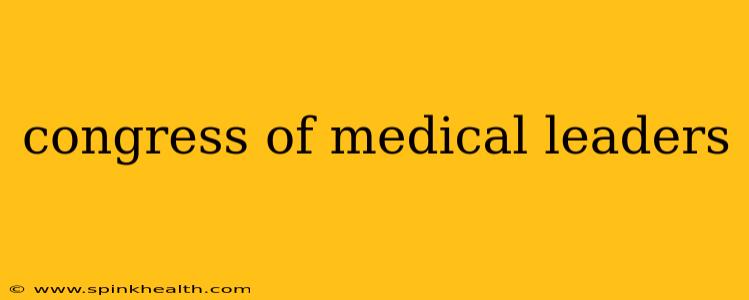The air crackled with anticipation. Rows of crisp white coats, punctuated by the occasional splash of color from a vibrant scarf or tie, filled the grand ballroom. It wasn't just any conference; this was the Congress of Medical Leaders, a prestigious gathering bringing together the brightest minds in healthcare from across the globe. The murmur of conversations, a symphony of scientific jargon and passionate debate, hung heavy in the air. This wasn't just about presentations and papers; it was about forging connections, sparking collaborations, and charting the course of medicine for years to come.
My journey to the Congress began months earlier, fueled by a burning desire to witness firsthand the collective brilliance shaping the future of healthcare. I'd heard whispers of groundbreaking research presented, of heated discussions on ethical dilemmas, and of revolutionary approaches to patient care. The anticipation was almost overwhelming.
Upon arriving, I was immediately struck by the palpable energy. Delegates, ranging from seasoned professors to rising stars in their respective fields, mingled with an infectious enthusiasm. The sheer diversity of backgrounds and specializations was breathtaking – cardiologists huddled with geneticists, neurosurgeons exchanged ideas with public health experts. The common thread? An unwavering commitment to advancing medical knowledge and improving patient outcomes.
What are the main topics discussed at the Congress of Medical Leaders?
The Congress covered a vast spectrum of crucial topics, reflecting the multifaceted nature of modern healthcare. Key themes included advancements in medical technology, ethical considerations in artificial intelligence (AI) and genomics, addressing global health disparities, and innovative approaches to medical education and training. Specific presentations ranged from the development of novel cancer therapies to the impact of climate change on public health. The sheer breadth of subjects was both daunting and inspiring.
Who attends the Congress of Medical Leaders?
The attendees represented a truly global and diverse cross-section of the medical community. Leading researchers from prestigious universities rubbed shoulders with clinicians from leading hospitals, pharmaceutical executives engaged with policymakers, and representatives from international health organizations contributed their expertise. The common denominator was a shared passion for pushing the boundaries of medical knowledge and improving healthcare worldwide. This blend of perspectives fostered rich and productive discussions, bridging the gap between research and practical application.
What are the goals of the Congress of Medical Leaders?
The overarching goal of the Congress is to foster collaboration and innovation within the medical field. By bringing together such a diverse group of experts, the event aims to facilitate the exchange of ideas, accelerate the translation of research into practice, and ultimately improve healthcare delivery worldwide. The specific goals varied from year to year, reflecting the evolving priorities of the medical community, but the core principle remained consistent: to unite leading figures to address the most pressing challenges facing healthcare today.
How does the Congress of Medical Leaders impact healthcare?
The impact of the Congress reverberates far beyond the confines of the conference hall. The collaborations forged, the insights shared, and the innovative solutions discussed contribute directly to advancements in medical research, the development of new treatments, and the improvement of healthcare systems globally. The long-term effects are far-reaching, influencing medical education, shaping healthcare policy, and ultimately improving the lives of patients worldwide. It's a testament to the power of collective intelligence and shared commitment.
Leaving the Congress, I felt a profound sense of optimism. Witnessing the dedication and passion of these medical leaders, their commitment to collaboration and innovation, instilled a renewed faith in the future of healthcare. It was a privilege to be a part of this gathering of minds, a collective force shaping a healthier world. The Congress of Medical Leaders wasn't just a conference; it was a movement, a testament to the enduring power of human ingenuity and compassion in the face of challenging medical frontiers.

